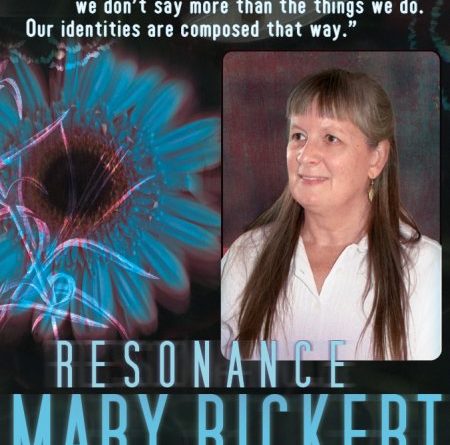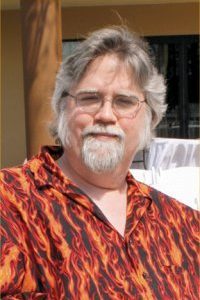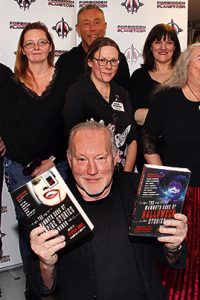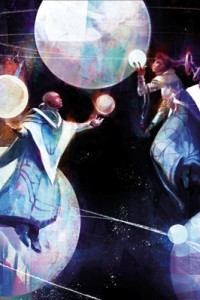Mary Rickert: Resonance
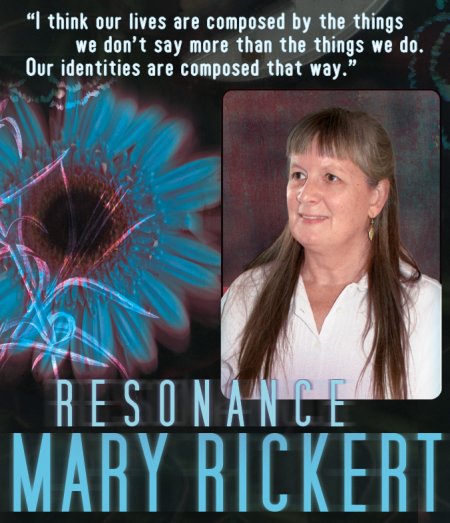
Mary Beth Rickert was born December 11, 1959 in Port Washington WI and grew up in the small town of Fredonia. She worked as a kindergarten teacher for ten years at a small private school for gifted children in California, and has also worked at a bookstore, a YMCA, a coffee shop, as a nanny, and for two years as a personnel assistant in Sequoia National Park. She earned her MFA from the Vermont College of Fine Arts.
Rickert began publishing under the byline M. Rickert, but in recent years has switched to Mary Rickert. Her first story was ‘‘The Girl Who Ate Butterflies’’ in F&SF (1999), and she has published about 40 stories in all, notably ‘‘Leda’’ (2002), ‘‘Bread and Bombs’’ (2003), ‘‘The Chambered Fruit’’ (2003), ‘‘Cold Fires’’ (2004), ‘‘Anyway’’ (2005), Nebula Award finalist and World Fantasy Award winner ‘‘Journey into the Kingdom’’ (2006), World Fantasy Award finalist ‘‘Map of Dreams’’ (2006), Shirley Jackson Award finalist ‘‘Holiday’’ (2007), Theodore Sturgeon Memorial Award finalist ‘‘You Have Never Been Here’’ (2006), Stoker finalist ‘‘Evidence of Love in a Case of Abandonment’’ (2009), Shirley Jackson Award winner ‘‘The Corpse Painter’s Masterpiece’’ (2011), and Shirley Jackson and Nebula Award finalist ‘‘The Mothers of Voorhisville’’ (2014).
Debut collection Map of Dreams (2006) won the Crawford Award for best first fantasy, as well as a World Fantasy Award. Second collection Holiday (2010) was a World Fantasy finalist. Her latest collection is You Have Never Been Here (2015). Debut novel The Memory Garden appeared in 2014 and won a Locus Award for best first novel.
Rickert lives in Cedarsburg WI with husband Bill Bauerband (married 2002).
Excerpts from the interview:
‘‘I struggled for a long time with the form of a novel. I wrote my first novel when I was really young, in high school. It took me years to lose that sort of natural ability and then get it back. When I was 30, I quit my job as a kindergarten teacher to dedicate myself to writing, and I was working on a novel. I probably worked on that novel for six years, in various forms. I got three short stories out of it. One problem was, I didn’t know what the main character’s job was. I thought, ‘I’ll have her be a writer and write myths.’ I put the myths in the novel, which was a mess, but those stories got published individually. They were ‘Leda’, ‘The Chambered Fruit’, and ‘The Machine’. I had the potential for a good novel there. I just could never get it right.
‘‘’The Mothers of Voorhisville’ was part of a novel, too. In its original form, it was long enough to be published as a novel itself! At one point, I tried doing three novellas as a novel: ‘The Mothers of Voorhisville’, ‘Pretty Brutal’, and ‘Five Days in Stone’. I love that title, ‘Pretty Brutal’. The stories kept morphing, and I was learning. That unpublished novel ‘Mothers’ came from took up nine years.
‘‘The Memory Garden was quicker. It took me about three years. I didn’t plot it out ahead of time. Here’s how it went. I worked for nine years on the novel, ‘Mothers’ came from. I never got that novel right and I thought, ‘What am I doing? Why do I keep trying to do this? I’m 55 years old. I can give myself permission to stop writing novels, and enjoy writing short stories. It’s time. It’s okay to let go of this and say I’m not a novel writer.’ Then I got this request from Jonathan Strahan asking me for a short story for Under My Hat, an anthology of young-adult witch stories. I started writing something, and realized as I kept going – uh oh. It was a novel. The story wanted to blossom. I wanted The Memory Garden to have the feel of memory and gardens, that blossoming.”
…
‘‘One of the things that came out when my mother was dying – and there are people in my family who would disagree with this – was that apparently somewhere in the world I have a brother I didn’t know about. I know there are stories like this, the story about the mother who had the pregnancy nobody knew about. But with my mom, this was incredibly earth-shaking, and it rocked my world. I’m still adjusting to the new foundation of my life. My mother was a very devout Catholic. We were raised as Catholics, and that was very important to her. When my book came out, she was living in a Catholic facility. They didn’t invite me to the book group, and she was so upset. When she thought the group was rejecting my novel because of the abortion material, she didn’t want anything more to do with being Catholic, and that didn’t make sense to me. This stuff all came out on her deathbed, with the strange things she was saying. It seems like in her past she had an unwanted pregnancy. I think she had a child. She made a different choice than the choice that was made in the book. With that novel, I felt like I was in a conversation with my mother that I didn’t know I was having. I felt just terrible, to think she was carrying that guilt around all her life.”
…
‘‘I think that part of the process of dying and letting go, which older people face, is the accounting – what is my life? I wrote the novel before my mom died. I’d never seen anyone die before. She had a terrible struggle at the end, and I think it was because of her unfinished business. I feel kind of haunted about it. I had this relationship with my mother that I thought was a certain kind of relationship, and it wasn’t. I wish she could have come to me with her secret, if it really did happen and this all wasn’t just the confusion of a dying mind. I do enjoy the fact that she loved my book. One of my favorite quotes from her is, ‘You sure do have a lot of stuff up there in that head of yours.’ I just baffled her. But she was supportive.”
…
‘‘Every idea I had for a novel before this was very large. I still think they all could have been really good novels, but the space was so large I got lost in it. The idea for The Memory Garden is pretty small. I contained it. One problem I’d have is that even though I had these big ideas, the novels would end up so short. I was working with Joshilyn Jackson and I told her that was a constant problem of mine. I had a draft. It was really short. She looked at it and said, ‘You’ve got this sentence here that has a lot going on. Make it into a paragraph.’ It was like, ‘Pow!’ The way forward seemed so obvious after that. I always say, ‘I can’t believe I was doing this for 20 years, and trying so hard, and trying so many things, and I never thought of opening up the sentences.’ That was it. Instead of getting this short thing finished, and then saying, ‘I’ve got to find ways to stuff more into it,’ I opened it up. I think that’s partly why it worked, with the blossoming feeling. Open up the sentences. The language during novel writing is just different from short story writing. I would love to be able to write a novel that’s like a short story. I still long to be able to do that – the kind of poetry and resonance, sentence after sentence having impact in a novel. But that’s really hard to sustain. I called them ‘egg sentences.’ There’s a lot in here, and I can open that up. Now I’m writing a new novel and I can recognize those sentences when I write them. I want to get a draft done, but I’m pretty sure I’ll come back and make paragraphs of them.”
…
‘‘I have had times in my life when I questioned whether I should continue writing. I love to write, but I wanted very much to have a career that supported my lifestyle financially. My big takeaway during my most recent time thinking of this was that I’d chosen a life of devotion. Devotion is an old fashioned word, and it’s a long game. When you live a life of devotion, the point isn’t what you get. The point isn’t any kind of result other than – did you devote yourself that day? When I put that new frame around my life and the choices I made, I became much happier. The devotion: did you write, did you listen today, did you read, did you think of stories today, did you practice? The other area in my life I devote myself to is yoga. I have a 25-year practice of yoga. I love that in yoga we say ‘practice.’ It isn’t, ‘Did you do it?’ It isn’t done. It isn’t, ‘Did you get paid enough for it?’ Though the yoga community struggles with that, too. It’s, ‘Did you practice every day?’ There’s a beauty in that, and a benefit. I’m devoted. I can be happy in that circumstance. In the end, everybody’s life is devotional. At some point it’s the end of life, and you ask, ‘What have I done?’”
Read the complete interview in the January 2016 issue of Locus Magazine. Interview design by Francesca Myman.


